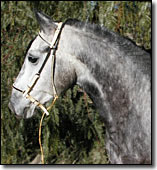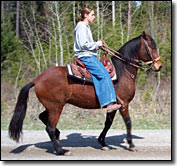|
What makes a Paso Fino so special?
There are many reasons that a Paso gets under your skin and into your heart-but it always comes down to one most enduring trait- their naturally genetic gait, creating for the rider the smoothest, most comfortable, mile after mile, "no bounce" ride of any horse you have ever encountered!
How do they do this?
 The
Paso gait is essentially a broken pace, a lateral, not diagonal
gait. The sequence of the hooves are: right rear, right fore,
left rear, left fore. The hind foot touches the ground a fraction
of a second before the front foot. When performed on a hard surface,
a definite 1,2,3,4 can be heard. Propulsion is primarily from
the hind legs yet the motion is absorbed through the back and
loins. The croup remains relatively still. These aspects eliminate
the jarring effects of a true pace and causes the rider practically
no up and down movement. This gait is performed at three speeds
with the collection of the carriage decreasing as the speed increases.
While all this may sound confusing, remember, this gait is
natural to a Paso Fino horse. The
Paso gait is essentially a broken pace, a lateral, not diagonal
gait. The sequence of the hooves are: right rear, right fore,
left rear, left fore. The hind foot touches the ground a fraction
of a second before the front foot. When performed on a hard surface,
a definite 1,2,3,4 can be heard. Propulsion is primarily from
the hind legs yet the motion is absorbed through the back and
loins. The croup remains relatively still. These aspects eliminate
the jarring effects of a true pace and causes the rider practically
no up and down movement. This gait is performed at three speeds
with the collection of the carriage decreasing as the speed increases.
While all this may sound confusing, remember, this gait is
natural to a Paso Fino horse.
Types of Paso Fino Gaits
The gait of Paso Fino horses is totally natural and usually exhibited from birth. No artificial devices or enhancements are used. The Paso is shown with a full, flowing mane and tail and no adornments such as silver are allowed on the tack or on the rider's costume. The emphasis is totally on the horse itself so no "distractions" from the horses' natural performance is encouraged.
 The Classic Fino gait is characterized by a very fast cadence with very little extension or forward movement. It is executed with a high degree of collection and usually reserved for the show ring. It is a low, very tight gait. Of the breed as a whole, only a small percentage of Pasos perform at this level. Capuchino, a famous stallion was reported to have 126 beats per minute and a 4 inch extension. When heard on a sounding board, people have equated the footfall to the sound of rolling thunder. While it is an exciting moment to see such a horse, the Fino gait has no practical purpose other than in the show ring. The Classic Fino gait is characterized by a very fast cadence with very little extension or forward movement. It is executed with a high degree of collection and usually reserved for the show ring. It is a low, very tight gait. Of the breed as a whole, only a small percentage of Pasos perform at this level. Capuchino, a famous stallion was reported to have 126 beats per minute and a 4 inch extension. When heard on a sounding board, people have equated the footfall to the sound of rolling thunder. While it is an exciting moment to see such a horse, the Fino gait has no practical purpose other than in the show ring.
The Paso Corto is a more relaxed form of the gait that is commonly referred to as the natural Paso Fino gait. Paso Corto is the ideal trail and pleasure gait as it uses only medium collection and light contact on the bit.
The Paso Largo is the speed form of the gait. It is equated to the speed of a "slow canter" but instead has the same 1,2,3,4 rhythm and the rider appears motionless in the saddle, as he should at all speeds of gait.
Is the Paso Fino versatile?
Yes, they are used for: Pleasure, showing, trail riding, endurance riding, driving, barrel racing, reining, mounted shooting competitions, and field dog trials. Some are trained for use on cattle ranches. There is also a class for jumping, similar to hunter hack.
In addition, the Paso Fino can and does walk. We encourage all of our Paso Finos to walk. A Paso also does canter, although it is not his preferred gait.
Remember: The Paso Fino is naturally gaited and usually it takes little effort on the rider's part. When a horse is trained, these gaits can be felt and with a little practice, the rider learns to identify which gait the horse is performing and may change the gait with the use of hands (collection) and the rider's seat to ask for the gait they want the horse to execute.
|